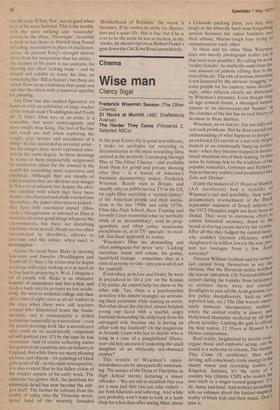Cinema
Wise man
Clancy Sigal
Frederick Wiseman Season (The Other Cinema) 21 Hours at Munich (ABC Shaftesbury Avenue) The Harder They Come (Filmcenta 2, Selected ABCs)
In the post-Easter dip in good new releases, I make no apologies for returning to documentaries as the most rewarding films around at the moment. Continuing through May at The Other Cinema — and available from them for group and private showing after that — is a season of America's foremost documentary maker, Frederick Wiseman. Rarely seen in Britain, and usually only on public service TV in the US, his eight films represent a 'natural history' of the American people and their institutions in the late 1960s and early 1970s. Films like High School, Basic Training and Juvenile Court transcend what we normally think of as 'documentary', with its propagandistic and often rather wearisome preachiness or, as in TV 'specials', its modish, fast-food approach to reality.
Wiseman's films are demanding and often ambiguous but never 'arty'. Lacking narration, music and colour, his grainy, hand-held footage — sometimes shot at a ratio of seventy-to-one — lets you work it out for yourself.
Even when, as in Law and Order, he went in prejudiced to 'do a job' on the Kansas City police, he cannot help but show us the other side. Yes, there is a psychopathic detective who almost strangles an unresisting black prostitute while making an arrest. But what about the puzzled, almost helpless young cop faced with a tearful, angry husband demanding his child back from his estranged wife because she is having an affair with the landlord? Or the magistrate in Juvenile Court who has to decide who is lying in a case of a pimplefaced fifteenyear-old boy accused of molesting the small daughter of an obviously sex-obsessed mother?
The results of Wiseman's openmindedness can be unexpectedly entertaining. The scenes of the Dean of Discipline in High School sternly lecturing a minor offender — 'We are out to establish that you are a man and that you can take orders' — are both hilarious and sobering. And while you probably,won't want to look at a lamb chop for a few days after seeing Meat, about
a Colorado packing plant, you may also laugh at the absurdly hard-nose bargaining session between the union butchers and their obtuse, Marine-tough boss trying to outmanoeuvre each other.
In these and his other films Wiseman does not merely photograph reality (as if that were ever possible). By calling his work 'reality fictions', he implicitly underlines the vast amount of patient editing that is the crux of his art. The risk of serious distortion is not lessened by the obvious 'mugging of some people for his camera; more disturbingly, other subjects clearly are distressed by Wiseman's presence. Even though they all sign consent forms, a deranged mental patient or an eleven-year-old 'hooker' in the clutches of the law has no real liberty of decision in these matters. Wiseman, an ex-lawyer, has not fully solved such problems. But he does extend our understanding of what happens to people — an awkward GI recruit or a not-very-bright student or an emotionally hung-up policeman — when they become trapped in institutional situations not of their making. In that sense he belongs less to the tradition of the populist romantics, Grierson and Flaherty, than to literary realists (and pessimists) like Zola and Dreiser.
If only the makers of 2 I Hours at Munieh (AA certificate) had a scintilla of Wiseman's tact and sensibility, their semidocumentary re-enactment of the Black September' massacre of Israeli athletes at the 1972 Olympics might not have been so dismal. They went to enormous effort to ensure historical accuracy, down to the brand of shaving cream used by the victimsAfter all this they fudged the central issue: why couldn't German efficiency, which slaughtered six million Jews in the war, pro' tect ten hostages from a few Arab terrorists? Director William Graham and his writers just cannot bring themselves to say the, obvious, that the Bavarian police botch the rescue operation. (At Furstenfeldbruck airport during the transfer from helicopter to airliner there were not enough floodlights to pick off the Arab gunmen, too few police sharpshooters, back-up units reported late, etc.) The film wavers uncertainly between 'documentary realism where the central reality is absent, and Hollywood dramatics neuIered by all that phony actuality. Lacking the guts to offend the host nation, 21 Hours at Munich is a
lifeless compromise. , Real reality, heightened by terrific rock
reggae music and explosive acting, can he found in a welcome re-release, The Harder They Come (X certificate). Shot With
driving, self-consciously crude energy in the, shanty towns and recording studios ot Kingston, . Jamaica, it's the story of a country boy (Jimmy Cliff) who makes his own myth as a singer-turned-gangster. It's
sly, funny and loud. And without preaching tells us volumes about the fantasy'-inspired reality of black kids and their music. Don't miss it.






































 Previous page
Previous page